
 i_need_contribute
i_need_contribute

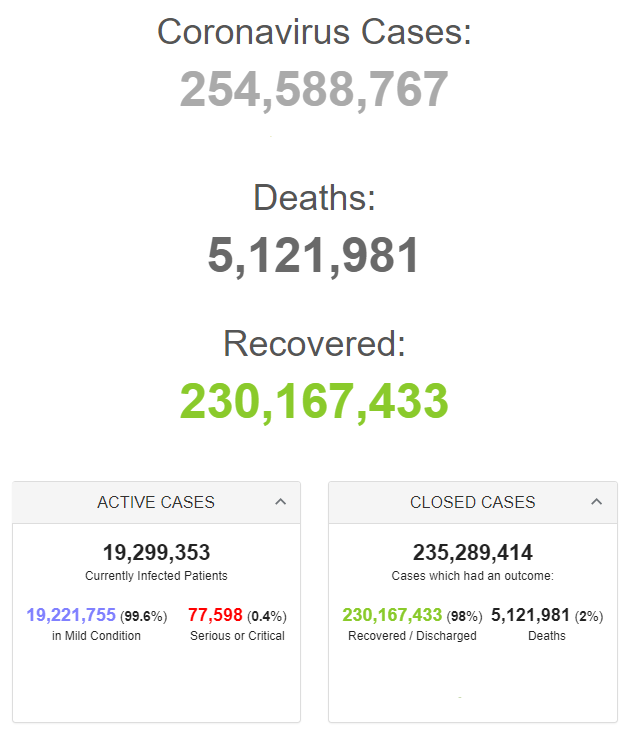

Retrieved from: https://www.worldometers.info/coronavirus/
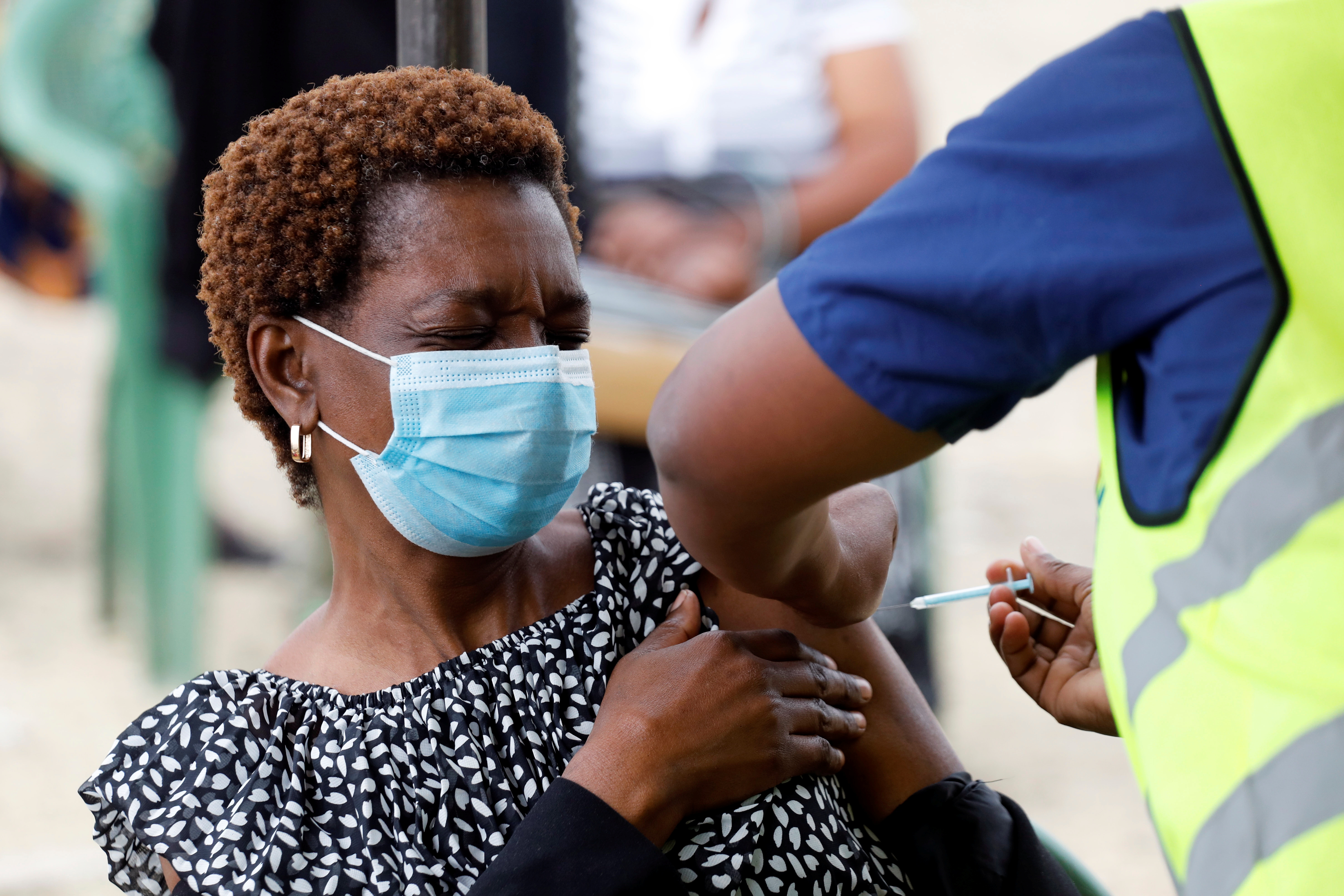
A woman reacts as she receives an AstraZeneca/Oxford coronavirus disease (COVID-19) vaccine, donated to Kenya by the UK government, in Nairobi, Kenya, August 8, 2021. REUTERS/Baz Ratner
Two billion doses of the AstraZeneca-Oxford University COVID-19 vaccine have been supplied worldwide, the Anglo-Swedish drugmaker and its partner said on Tuesday, in just under a year since its first approval.
The shot, which is the biggest contributor to the COVAX vaccine sharing scheme backed by the World Health Organization, is being made in 15 countries for supply to more than 170 countries, London-listed AstraZeneca and Oxford University said in a joint statement.
AstraZeneca (AZN.L) in June last year signed on India's Serum Institute, the world's biggest manufacturer of vaccines by volume, to help double the vaccine's manufacturing capacity to two billion doses.
The ChAdOx1 nCoV-19 shot, sold under the brand names Vaxzevria and Covishield, has faced challenges around efficacy data, supplies and links to rare blood clots.
AstraZeneca last week said as the world learns to live with the coronavirus which causes COVID-19, it would begin to earn a modest profit from the shot after having made a commitment to sell it at cost during the pandemic. read more
The company's chief executive officer, Pascal Soriot, however, reassured that low-income countries would continue to receive vaccines on a non-profit basis.
Retrieved from: https://www.reuters.com/business/healthcare-pharmaceuticals/astrazeneca-oxford-covid-19-vaccine-supply-hits-two-billion-doses-2021-11-16/
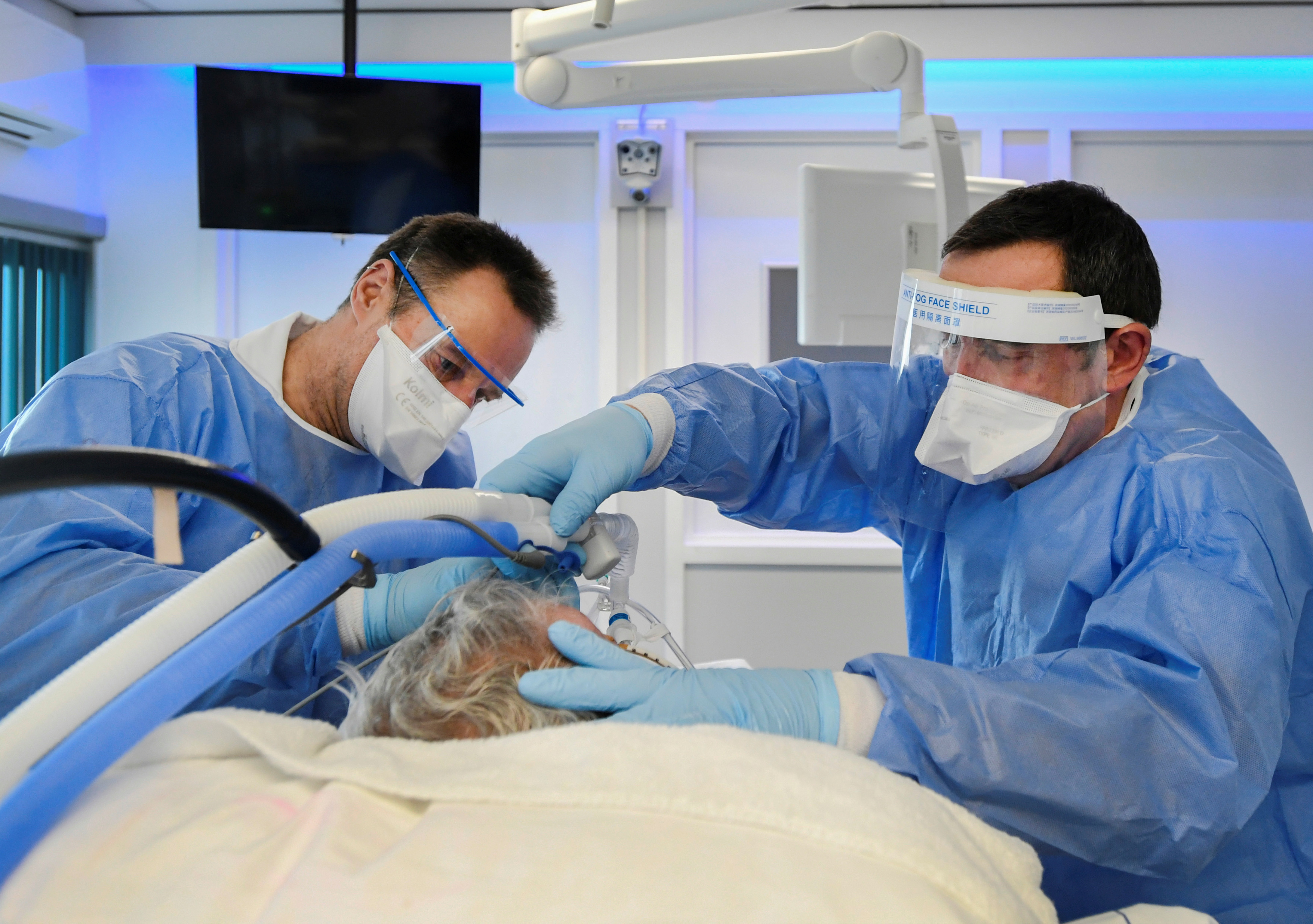
Members of the medical personnel wearing full protective suits are seen as they treat a patient infected with the coronavirus disease (COVID-19), in the intensive care unit at Maastricht UMC+ Hospital in Maastricht, Netherlands, November 10, 2020. REUTERS/Piroschka van de Wouw
Dutch hospitals are feeling the strain from a surge in COVID-19 patients but the worst has yet to come, the head of the country's hospital association said on Monday.
The number of COVID-19 patients in Dutch hospitals increased to around 2,000 on Monday, including almost 400 in intensive care, reaching the highest level since May.
With almost 250 new admissions every day, the hospitals are set to pass last winter's peak of around 2,800 coronavirus patients in little over a week, the LNAZ association’s head, Ernst Kuipers, told lawmakers.
"We haven't seen the peak yet, numbers will continue to rise," Kuipers said.
Hospitals throughout the country have been scaling back regular care for weeks in order to deal with urgent COVID-19 patients.
Hospitals in the southern province of Limburg, one of the worst-hit regions, last week even said they had no space or staff to handle more coronavirus patients. read more
The Netherlands returned to a partial lockdown last Saturday after the government ordered restaurants and shops to close early and barred spectators from major sporting events in an effort to contain the rapid surge in cases. read more
Over 100,000 new infections were registered in the week through Monday, the highest level for a single week since the start of the pandemic.
In the past week, an average of around 14,500 new cases were confirmed every day in the country of 17.5 million, beating the previous record of just under 13,000 infections in a day set in December last year.
Coronavirus cases are at record levels across Europe, with Germany reporting its highest level since the start of the pandemic on Monday, while Austria entered a lockdown for people not vaccinated against the coronavirus. read more
Around 85% of the Dutch adult population has been fully vaccinated against COVID-19, and the country will start to administer booster shots to health workers and the elderly at the end of this week.
Retrieved from: https://www.reuters.com/world/europe/pressure-dutch-hospitals-mounts-covid-cases-break-records-2021-11-15/
Arkansas on Monday joined Colorado, California and New Mexico in broadening access to Covid-19 boosters, getting ahead of federal regulators who are close to making a decision on expanded eligibility.
Gov. Asa Hutchinson of Arkansas said at a news conference on Monday that he had directed the state health department to issue new guidelines on boosters to allow all adults to get one, provided they meet the timing rules. The move made Arkansas the latest state to issue a decision on boosters ahead of a federal ruling.
State leaders have found themselves in a conundrum since August, when President Biden’s plan to make boosters available to all adults was halted by regulators. The leaders have had to decide: Do they wait for a federal directive, or do they make their own vaccination rules?
The decisions they make are more timely than ever, as the United States braces for a possible winter surge. As of Monday night, reported new cases in the United States have averaged nearly 85,000 a day for the past week, a 14 percent increase from two weeks ago, according to a New York Times database. Reported new deaths are down 14 percent, to 1,129 a day; hospitalizations have decreased seven percent and are averaging more than 46,000 a day.
And in Europe, where the Covid trends are often a harbinger of those in the United States, a fourth case wave has been driven by the unvaccinated.
Four states, including Arkansas, aren’t waiting for a federal decision on boosters, and, on Monday, New York City became one of the first major cities to tell all adults to get a booster if they want one regardless of whether they are eligible.
In Arkansas, a spokeswoman for the Arkansas health department said it had updated its recommendations and would be advising health care providers that they can administer the boosters to an expanded pool of adults.
“What we’re finding is that we want more people to get their booster shot and that this is somewhat confusing and limiting as to the eligibility,” Mr. Hutchinson said, adding, “we’re changing that.”
However, a spokeswoman for the governor’s office said that Mr. Hutchinson had no plans to issue an executive order to expand booster eligibility.
According to the health department guidelines, Arkansas adults are now eligible for the vaccine booster if it has been at least six months since their second shot of the Pfizer or Moderna vaccine, or at least two months since they received the single-dose Johnson & Johnson vaccine.
A growing body of early global research has shown that the vaccines remain highly protective against hospitalization and death, but that their effectiveness against infection wanes over time. Public health experts say this does not mean the vaccines are not working.
Last week, Pfizer and BioNTech requested that the Food and Drug Administration expand eligibility of their booster to all adults, a request the agency is expected to grant before the winter holiday season.
Ahead of a formal recommendation from the federal authorities, several other states have taken different approaches to expand booster eligibility.
The governors of Colorado and New Mexico signed executive orders last week expanding eligibility to all adults. In California, Dr. Tomás J. Aragón, the state’s public health director, issued a letter last week that said anyone 18 or over is eligible.
The authorities in New York and West Virginia on Monday encouraged all adults to get the booster, but stopped short of a formal policy change. New York City health officials told health providers to give booster shots to all adults who want them, — guidance that was echoed by Gov. Kathy Hochul. In West Virginia, Gov. Jim Justice said adults should “absolutely get” a booster.
Retrieved from: https://www.nytimes.com/live/2021/11/15/world/covid-vaccine-boosters-mandates
By Forrest Brown and Marnie Hunter, CNN
The US Centers for Disease Control and Prevention added three popular European nations and a small, idyllic island destination to its list of "very high" risk travel destinations on Monday as a new Covid-19 surge continues to sweep much of Europe.
The four destinations moved to Level 4, the highest risk category, are:
• Czech Republic
• Guernsey
• Hungary
• Iceland
With their ornate architecture and rich cultures, the Czech Republic and Hungary have been two of the darlings of Central European travel ever since the fall of the Iron Curtain in the late 20th century.
Iceland -- land of glaciers, geysers and volcanoes -- is a big draw among outdoor adventurists. And little charming Guernsey is a self-governing British Crown dependency in the English Channel not far from the coast of France.
Destinations that fall into the CDC's "Covid-19 Very High" Level 4 category have had more than 500 cases per 100,000 residents in the past 28 days.
People should avoid traveling to locations designated with a "Level 4" notice, the CDC recommends. Anyone who must travel should be fully vaccinated first, the agency advises.
Previously, all four destinations had been listed in the Level 3 category of "Covid-19 High" risk. By moving to Level 4, they join the ranks of other travel favorites in Europe and elsewhere. They include:
• Belgium
• Netherlands
• Singapore
• Turkey
• US Virgin Islands
In all, more than 70 destinations are currently at Level 4. The United Kingdom and British Virgin Islands have been lodged at Level 4 since July 19.
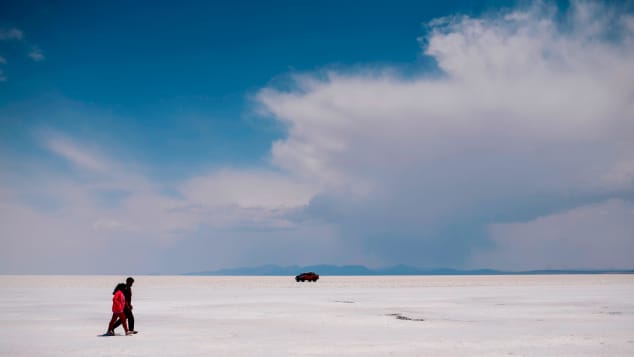
Salar de Uyuni, the world's largest salt flat, is one of Bolivia's otherworldly landscapes.
Ronaldo Schemidt/AFP via Getty Images
The Level 3 category -- which applies to destinations that have had between 100 and 500 cases per 100,000 residents in the past 28 days -- had three updates this week.
• Bahamas
• Bolivia
• Papua New Guinea
The move was actually good news for the Bahamas, a tourism-dependent destination, and Papua New Guinea -- both had been at Level 4.
For Bolivia, known for its otherworldly landscapes, the move signals an increase in cases as it previously was listed at Level 2.
You can view the CDC's risk levels for global destinations on its travel recommendations page.
There are other factors for travelers to consider beyond the Covid-19 incidence rates that figure prominently in the CDC's travel notices, according to CNN Medical Analyst Dr. Leana Wen.
"The transmission rates are one guidepost. Another is what precautions are required and followed in the place that you're going and then the third is what are you planning to do once you're there," said Wen, an emergency physician and professor of health policy and management at the George Washington University Milken Institute School of Public Health.
"Are you planning to visit a lot of attractions and go to indoor bars? That's very different from you're going somewhere where you're planning to lie on the beach all day and not interact with anyone else," said Wen, who is also author of a new book, "Lifelines: A Doctor's Journey in the Fight for Public Health."
Most importantly, travelers should be vaccinated, she said.
The CDC moved exotic Morocco, in the northwest corner of Africa, down from Level 3 to Level 2.
Destinations carrying the "Level 2: Covid-19 Moderate" designation have seen 50 to 99 Covid-19 cases per 100,000 residents in the past 28 days.
Keep in mind the CDC list updates weekly, and the situation in any country can change for better or worse from week to week.
In the category of "Level 1: Covid-19 Low" destinations, fewer than 50 new cases per 100,000 residents have been logged over the past 28 days.
Six destinations moved into Level 1 on November 15:
• Gambia
• India
• Japan
• Liberia
• Mozambique
• Pakistan
India's move to Level 1 is particularly noteworthy as it was in a horrific crisis with Covid-19 this past spring.
Finally, there are destinations for which the CDC has an "unknown" risk because of a lack of information. As of November 15, that list included Madagascar, Cambodia, Nicaragua and Macau.
In its broader travel guidance, the CDC has recommended avoiding all international travel until you are fully vaccinated.
"Fully vaccinated travelers are less likely to get and spread Covid-19. However, international travel poses additional risks, and even fully vaccinated travelers might be at increased risk for getting and possibly spreading some Covid-19 variants," the agency said.
Retrieved from: https://www.cnn.com/travel/article/cdc-very-high-risk-travel-destinations-november-15/index.html
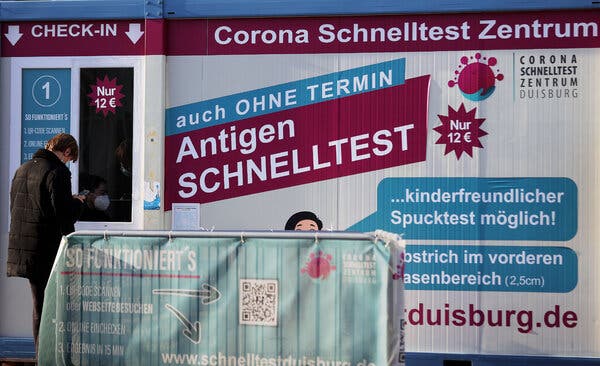
A Covid-19 rapid test centre in Duisburg, Germany, last week. New nationwide restrictions have been announced to counter a surge in infections.Credit...Friedemann Vogel/EPA, via Shutterstock
ROME — As temperatures drop and coronavirus infections spike across Europe, some countries are introducing increasingly targeted restrictions against the unvaccinated who officials say are driving another wave of contagion and putting economic recoveries, public health and an eventual return to prepandemic freedoms at risk.
On Monday, the Austrian government cracked down on its unvaccinated population over the age of 12, restricting their movement to traveling for work, school, buying groceries and medical care. New cases have more than doubled in Austria in the last two weeks.
Across Europe countries are passing rules and measures to make life harder for the unvaccinated with the goal of motivating them to get a shot.
In Italy, vaccination, recent recovery from the virus, or frequent negative swabs are required to work. In Germany, the incoming government has said it will impose stricter rules against unvaccinated people, including mandating that they obtain a negative coronavirus test before traveling on buses or trains. In France, booster shots will become requisite for people 65 and older who want to secure a health pass.
Taken together, the measures are a bleak sign that a virus is still a threat to Europe, which reported a 10 percent increase in deaths and a 7 percent increase in new infections in the first week of November, compared to the previous week. The World Health Organization warned recently that half a million people on the continent could die from Covid in the next few months.
While the hospitalizations and deaths were mostly in Eastern Europe, the new wave threatened economic recoveries and Christmas vacations across the continent. A return to normalcy predicated on the success of vaccination campaigns seemed increasingly threatened by the unvaccinated who offered the virus room to run.
This is especially the case in Eastern Europe. Romania, which has Europe’s second-lowest vaccination rate, recently reported the world’s highest per capita death rate from Covid-19. In Bulgaria, hospitals are inundated. Last month, the small Baltic nation of Latvia responded to its outbreak with a full lockdown. Russia and Ukraine, which each have vaccination rates below 50 percent, also introduced widespread restrictions.
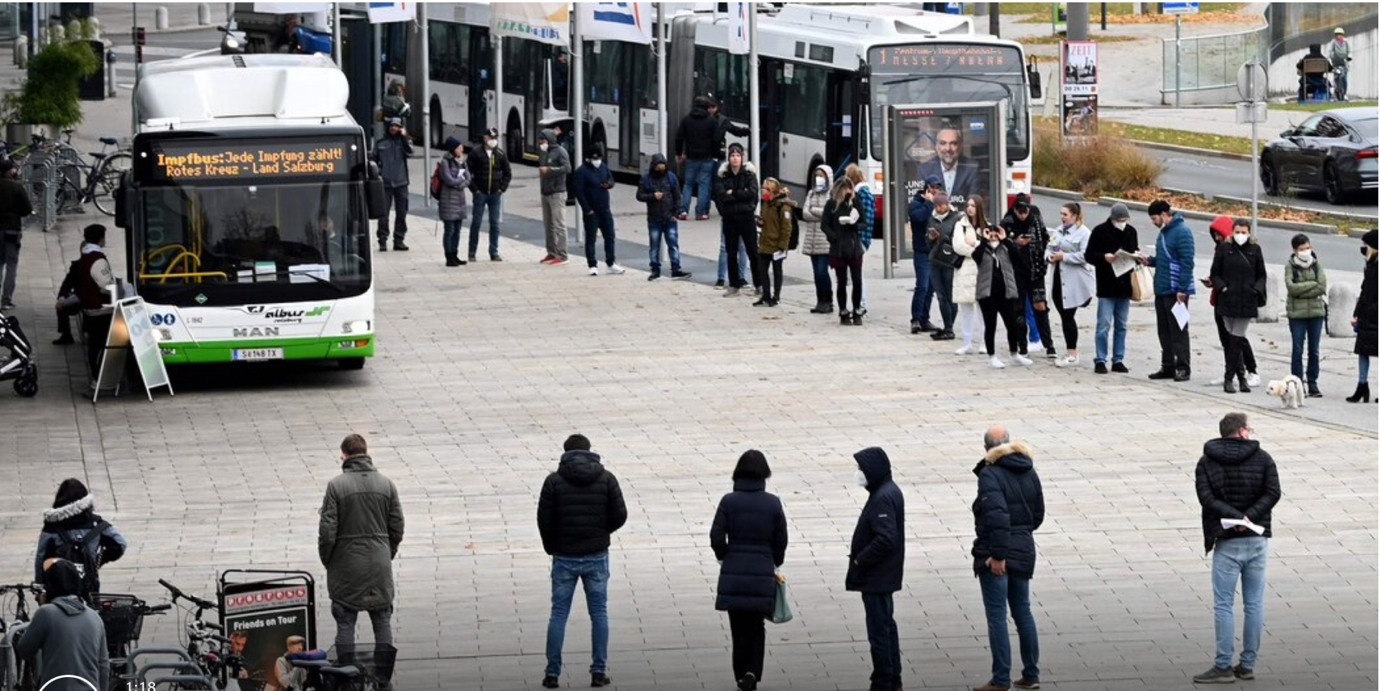
The lockdown, expected to last 10 days, requires those age 12 and older who are not vaccinated for Covid-19 or immune from a past infection to stay in their homes except for essential reasons, such as doctor visits or grocery shopping.CreditCredit...Barbara Gindl/Agence France-Presse, via Apa/Afp Via Getty Images
Unvaccinated Austrians ages 12 and older awoke on Monday morning confined to their homes for all but essential activities, as one of the strictest coronavirus lockdowns in Europe went into effect to battle a surge in infections.
Under new rules announced by the government on Sunday, adults and minors 12 and older who have not been vaccinated or recovered from a coronavirus infection cannot go outside except to buy groceries, seek medical care or travel to school or work. They are the toughest of a new wave of restrictions across Europe, as governments try to contain near-record numbers of cases.
“Our task as the federal government is to protect the people of Austria. We are fulfilling this responsibility,” Chancellor Alexander Schallenberg told a news conference on Sunday.
The move was described as temporary, but the government did not immediately say how long it would remain in effect.
About 65 percent of Austria’s 8.9 million people are vaccinated, one of the lowest rates in western Europe, according to the Our World in Data Project at the University of Oxford. Over the past two weeks, average daily cases have risen by 134 percent to nearly 11,000, the highest since the pandemic began.
Mr. Schallenberg said that the vaccination rate was a significant cause of the spike in infections, and added that cases among the vaccinated were decreasing. Since February, unvaccinated people account for 83 percent of symptomatic infections, according to Austrian officials.
Speaking on Monday, Mr. Schallenberg said that there were no immediate plans to expand restrictions for vaccinated people. That ran counter to a suggestion by his health minister, who said that the government might consider a more generalized lockdown, such as closing bars or restaurants.
“My aim is very clearly to get the unvaccinated to get themselves vaccinated and not to lock down the vaccinated,” Mr. Schallenberg told Austria’s Ö1 radio, according to The Associated Press. “In the long term, the way out of this vicious circle we are in — and it is a vicious circle, we are stumbling from wave to lockdown, and that can’t carry on ad infinitum — is only vaccination.”
Europe, which threw off lockdowns this summer but has seen vaccination rates level off, is “back at the epicenter of the pandemic globally,” Hans Kluge, the regional director for the World Health Organization, said last week. The continent accounted for 59 percent of the world’s newly reported coronavirus cases last week, and for nearly half the world’s Covid-related deaths, the organization said.
Over the weekend, the three parties that are set to form the next government in Germany agreed to impose stricter rules against unvaccinated people, including mandating that they obtain a negative coronavirus test before traveling on buses or trains, as infection rates reach new records. Spain’s Basque region is also expected on Tuesday to announce new restrictions on gatherings in municipalities with the highest infection rates.
But Austria’s move stands out as among the toughest imposed in Europe or elsewhere in the world, experts said. In Britain, where cases have risen sharply since May, the Conservative lawmaker Oliver Dowden said on Sky News on Monday that the government would not follow Austria’s lead, saying that “we have no plans to have that kind of differentiated approach between” between those who are vaccinated and those who are not.
Robert West, a professor of health psychology at University College London, said that Austria’s rules might encourage more people to get vaccinated, but risked eroding trust in the government.
“It’s sort of like jumping in with the nuclear option without having considered the other options,” he said, adding that it would have been better to address the causes of vaccine skepticism among parts of the Austrian public.
“I think this is a disaster on all fronts,” he said.
Retrieved from: https://www.nytimes.com/2021/11/15/world/europe/austria-covid-vaccine.html
Here’s a round-up of the day’s leading Covid stories:
Europe:
· Police in Austria have begun carrying out routine checks on commuters to ensure compliance with a nationwide “lockdown for the unvaccinated”, as the Alpine country tries to get on top of one of the most rapidly rising infection rates in Europe.
· Germany’s prospective coalition government is pondering lockdown restrictions for the unvaccinated, as infections in the country continue to rise. Measures could include requiring the unvaccinated to show proof of a negative test before travelling by bus or train.
· Belgium’s government is bringing forward a meeting to decide on tighter measures to control the spread of Covid-19 amid a rapid increase in infections and hospital admissions.
· Britain’s booster vaccine rollout is to be extended to people aged between 40 and 49, officials said, in a bid to boost waning immunity in the population ahead of the colder winter months.
· UK prime minister Boris Johnson warned people against complacency, saying that a new wave of Covid has “steadily swept through central Europe” and is now affecting the nation’s closest neighbours.
· Employers in Latvia are allowed to dismiss employees who refuse to get vaccinated against Covid-19 from Monday.
· The pressure on Dutch hospitals mounts from a surge in Covid-19 patients as cases break records. The worst has yet to come, the head of the country’s hospital association said on Monday. The number of Covid-19 patients in Dutch hospitals increased to about 2,000 on Monday, including almost 400 in intensive care, reaching the highest level since May.
Americas:
· US president Joe Biden’s vaccine requirements are prompting more Americans to get Covid shots, White House press secretary Jen Psaki said.
· The US Centers for Disease Control and Prevention (CDC) advised against travel to the Czech Republic, Hungary and Iceland because of a rising number of Covid-19 cases in those countries.
· Peru, the country with the world’s highest Covid-19 mortality rate, is to require adults to show proof of vaccination to enter indoor spaces from next month.
Asia:
· India opens again to foreign tourists from countries with reciprocal agreements after a 20-month ban due to the pandemic.
· Thousands of children in the Philippines are allowed to return to classrooms for the first time since the start of the pandemic.
· Cambodia announces that fully vaccinated foreign travellers can visit the kingdom without quarantine.
· China is battling the spread of its biggest Covid-19 outbreak caused by the Delta variant as case numbers in the north-eastern city of Dalian outpace anywhere else in the country. The Dalian outbreak has prompted China to confine nearly 1,500 university students to their dormitories and hotels in the city.
· China’s president Xi has agreed to upgrade the “fast track lane” for US business figures to come to the country, Chinese state media reports.
Oceania:
· Australia’s Indigenous vaccination rates continue to lag across every jurisdiction amid heightened fears over an outbreak in the Northern Territory. Nationally, just under 58% of Indigenous people aged 16 and older are double-dosed, while about 69% are partially vaccinated, much lower than Australia’s overall double-dose rate of 83%.
Africa/Middle East:
· Israel gave the green light Sunday to start vaccinating children aged between five and 11 against Covid-19 using Pfizer/BioNTech jabs.